Sober Kids Canada
For Youth
Cannabis – Questions and Answers
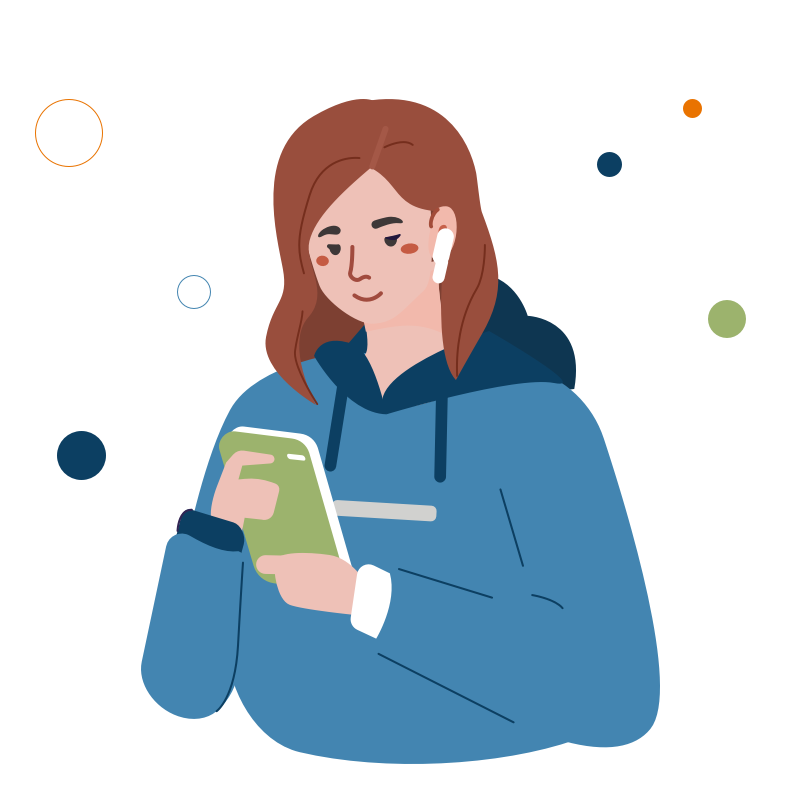
Cannabis -what is it and why do people do it?
Cannabis is a hemp plant. It goes by a lot of different names, including marijuana, weed, hash, bud, chronic, pot, reefer, weed/hash oil, etc.
People use cannabis, largely, because of the mind altering effects of a substance in the plant called THC (Delta-9-tetrahydrocannabinol). When someone smokes (or eats) cannabis, THC causes the brain to release dopamine, which is a ‘feel good’ chemical produced in our brain. THC tricks the mind into releasing this natural chemical that the brain normally releases with healthy activity like exercise, eating good tasting food, etc. THC in cannabis tells the brain to ‘feel good’ and the brain responds by releasing dopamine in higher levels than it usually would if you were doing healthy activities.
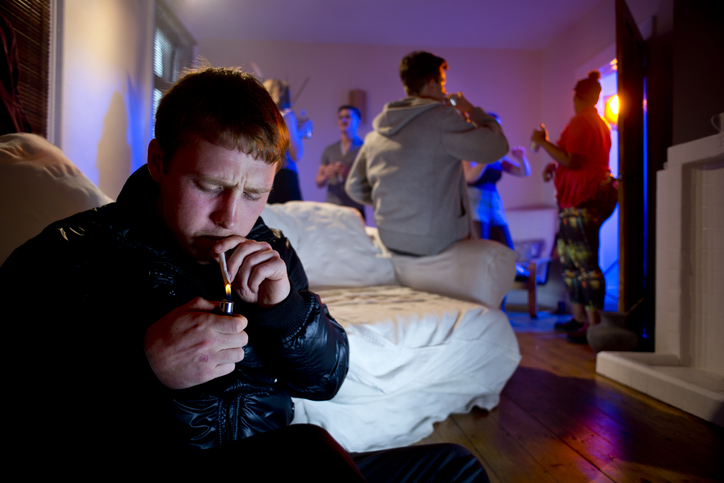
Isn’t cannabis ‘just a plant’? What’s the big deal?
Cannabis is not ‘just a plant’. While it is true it can grow naturally (in nature), it is important to remember that not everything that grows naturally is inherently good for you. For example, Poison Ivy is also ‘just a plant’ but it can give you rashes and blisters if you touch it. Similarly, a cocoa plant is ‘just a plant’ but it is also is used to create harmful/addictive drugs like cocaine.
It is also no longer accurate to say that cannabis is ‘just a plant’ growing naturally without human interference. While this might have been true in the 1960s, cannabis strains are now bred and engineered by many growers to have increasingly higher THC levels. As a result, the potency of cannabis has tripled over the past 30 years 62.
In short, cannabis is a drug that is being continually modified by many (but not all) growers/sellers to become a stronger and stronger drug. As a result, cannabis can get you higher than it used to and can be ingested in more different ways than it used to. At the end of the day, it is a drug that is intended to get you stoned.
Doctors prescribe cannabis – How can it be bad for you?
Cannabis is often prescribed by doctors for some beneficial uses including pain, nausea and poor appetite. In this regard, it is sometime used by medical professionals to treat people with conditions such as cancer, AIDS and multiple sclerosis.
Just because cannabis is used to treat medical conditions does not mean it is healthy for everyone to use. In this way, cannabis is similar to many other drugs. Used under a doctor’s care/supervision, some drugs can be good for you, while the same drugs used for non-medical purposes (without a doctor’s advice) can be extremely harmful. There are a lot of potential negative impacts on the brain of teenagers (and adults) who use cannabis for non-medical reasons.
What are the potential harms of cannabis use by teenagers?
In Canada it is illegal for teenagers to use cannabis. The reason it is illegal for teens to use cannabis has mainly to do with the potential harms it can have on a young brain that is developing. The harms of cannabis use by teens are as follows:
- Risk of addiction – Like any mind altering substance, cannabis can be addictive. This is even more the case for youth than adults. Because the teen brain is still developing, it is more prone to the pleasurable effects of THC. Teens can become more easily dependent on the dopamine hit (feel good release of chemicals) from THC than adults. In other words, the teen brain can be more easily trained by cannabis to need it to feel good, and this can establish a pattern of addiction that can stretch into the adult years. 95% of adults with substance use disorders started using drugs (often cannabis) before the age of 17.
- Risk of hospitalization – Cannabis is the leading cause of hospitalizations for youth in Canada. As of 2017-2018, 40% of all youth emergency room visits/hospitalizations were related to cannabis use 63 .
- Stunting/slowing of emotional development – It is well established by scientific research that teens’ brains are more vulnerable than adults to the harmful effects of cannabis. Use of this drug by teens often results in impaired brain development, and stunting/slowing of emotional functions 64 . In other words, a teen who starts regularly using cannabis at age 13 can, at age 20, be relying on the emotional skills of a 13 year old to get through life (13 being the age they started cannabis use).
- Poor school performance /poor job prospects as an adult – Teen cannabis use negatively impacts school performance. It impairs the ability to think, problem-solve and remember things. Generally, students who use cannabis have much worse outcomes for education than those who do not use the drug 65 . Teens who use cannabis regularly are therefore at greater risk of having worse jobs/future income ability than teens who do not use cannabis.
- Increased risk for short and long term mental health issues – There is a strong correlation between regular teen cannabis use and long-term mental health issues, including symptoms of psychosis and schizophrenia 66 . Further, teens who use cannabis are at increased risk of developing depression and suicidal behaviour into young adulthood 67 .
- Risk of death or injury in car accidents – A driver of a vehicle who is using cannabis has double the risk of being involved in a fatal car crash. Further, if a driver mixes alcohol and cannabis he/she is 40 times more likely to be involved in a fatal car crash 68 .
Is cannabis addictive?
Like any mind altering substance, cannabis can be addictive. Out of the entire population in Canada who use cannabis, 1 out of 10 of these people will develop a cannabis addiction 69.
Youth are even more prone to developing an addiction to cannabis. 16% of teens who try cannabis will likely go on to become addicted to it 70.
The higher rates of addiction for teens is related to youth brain development. At the earlier stage of brain development in the teenage years, the brain is more prone to being hooked into a cycle of dependence on drugs.
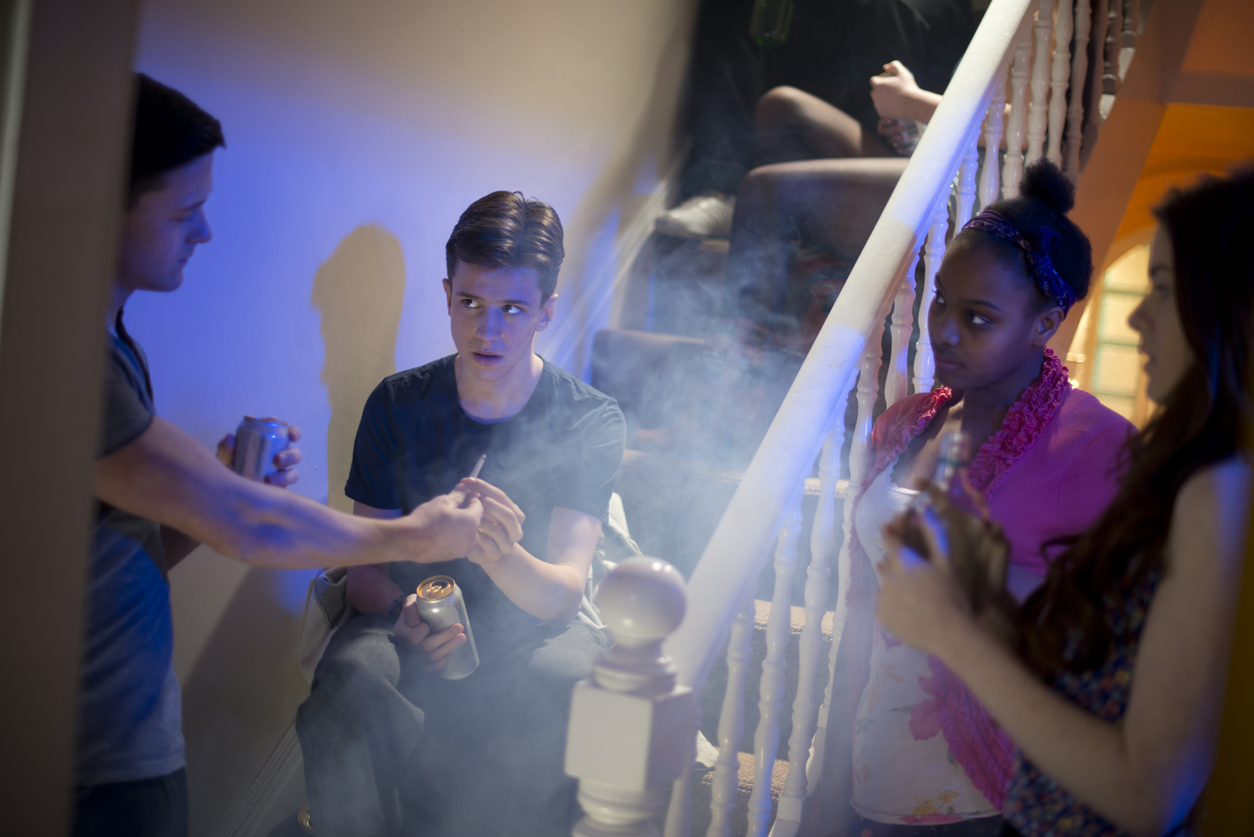
Addiction runs in my family – what does that mean for me if I use cannabis?
If you come from a family with a history of addiction, this means that you are 50% more likely to be addicted to cannabis or any other drug. Keep in mind that the addiction itself would not likely be triggered unless you started using mind altering drugs regularly in the first place. So a better way to say it is that, if your family has a history of addiction, and you choose to smoke cannabis regularly, you are 50% more likely than other kids to eventually develop an addiction.
Addiction is a disease which is largely based on genes. Some people have genes/body chemistry that makes them more prone to getting addicted to substances. This is no different than some families being more prone to heart disease or other illnesses based on their body types and genes.
There is nothing wrong with you or anyone in your family because of these genes. Addiction is a common disease like many others (cancer, etc.). But if you have these genes, it does mean you should be more aware of these risks before you decide to use cannabis.
Are certain kinds of cannabis better for me? Smoking, vaping, edibles, are they all the same?
There is no type of cannabis use that is ‘good’ for the teenage brain. No matter how it is used, whether smoked, eaten, vaped etc. every type of cannabis use delivers THC into your body and tricks your brain into releasing the feel good chemical dopamine. The teenage brain can be harmed (LINK TO THE HARMS ON HARMED) in the same way, with the same risks (LINK TO THE HARMS ON RISKS) no matter how to put cannabis into your body.
There is also a myth that edibles are not as harmful for teens because they avoid breathing in cannabis smoke. This is a myth because edibles, if anything, can be more potentially harmful for use by teens. The ‘get high affect’ from edibles can be much longer than from smoking cannabis, and edibles can often have higher potency. The higher potency of edibles leads to increased risks of youth experiencing paranoia, panic attacks and hallucinations. The increased appetite caused by THC can also inadvertently lead to kids eating more edibles than they should 71 . Over-consumption of edibles by teens often leads to cannabis poisoning and is a significant factor in emergency room visits by teens 72 .
My friend/friends’ group has started using cannabis – What does that mean for me?
Most people become who they hang out with (this goes for both adults and kids). So, the first thing you have to ask yourself is this: “Do I want to be someone who uses cannabis?” If the answer is no, then you may face a tough choice of either getting new friends or choosing not to hang out with certain friends at times they are using cannabis. The more you hang out with people who use cannabis, the more likely you will eventually do the same as those around you. Again, this is not a teenage phenomenon, adults often become who they hang out with as well.
Here, we want to note a difference between trying to helping a friend vs. protecting yourself. If you feel a friend has an addiction, it does not mean they are ‘bad’. Addiction is a disease. However, at the same time, you need to be cautious about socializing with friends who use cannabis regularly. Generally, the more a teenager hangs out with groups who use cannabis, the greater the likelihood she will eventually use cannabis herself.
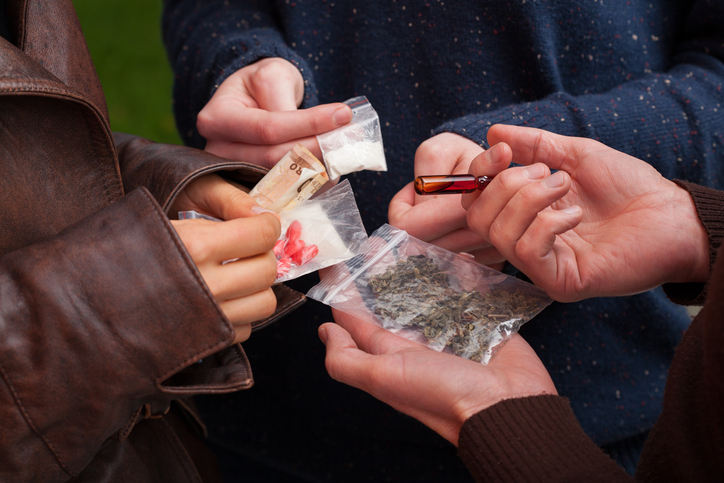
I don’t want my friends to use cannabis – can I get them to stop?
You can tell a friend (or any adult) how you feel about their using cannabis, but you cannot make anyone stop doing it. In other words, you can’t control your friend’s behaviour, you can only control yourself. Sure, you can let your friends know that you are worried about them using cannabis, and you can try and get your friend some help. But at the end of the day, your friends will make their own choices and there is not much you can do about another person’s choices, whether it’s a teenage friend or an adult. When it comes to drug use, you have to look out for number one (you).
What can I do to help a friend who I think is using cannabis too much?
While you cannot stop a friend from choosing to use cannabis, there are some things you can do to help. Here are some suggestions:
- You can talk to your friend, and tell them what you are seeing when they are using cannabis (this is what I am seeing, here is what I am worried about in your behaviour etc.).
- You can/should talk to your parents – Telling your parents you are worried about a friend who is using cannabis is not ‘ratting them out’. Instead, it means you care and you want to find a way to help them. Your parents can often be a good source of information on what to do if one of your friends is using drugs.
- Talk to a school counsellor or another adult you trust – Most schools have counsellors you can speak with confidentially about issues like underage cannabis use. If you are really worried about a friend’s behaviour with drug use, you can/should talk to a school counsellor. It is OK to love a friend enough to try and help them, even if this means they risk getting into a bit of trouble at home.
- The Kids Help Phone BC (1-800-668-6868) provides free 24 hour a day counselling services to kids or teens who might be suffering from issues relating to drug use or any other problem. This service can give you some helpful tips/advice on what you can do to help your friend, if anything. More information on this service can also be found at https://kidshelpphone.ca/.
I think I have a problem with using cannabis, how can I get help?
Using cannabis or any mind altering drug can result in a substance use disorder/addiction. You can become dependent on it. If you think you might have a problem with cannabis, there are lots of great resources you can contact in BC in or near your hometown. For more information you can visit our get help page and select the town closest to you. Most of these places will likely talk to you confidentially, and if they cannot help you, they can likely direct you somewhere that can help.
There is also 24 hour- telephone help available for anyone in BC who thinks they might be suffering from an addiction to cannabis or any other drug. This is provided through the BC Alcohol and Drug Information and Referral Service which can be found at the following link: https://www.healthlinkbc.ca/health-topics/alcohol-and-drug-use-young-people
The Kids Help Phone BC (1-800-668-6868) provides free 24 hour a day counselling services to kids or teens who might be suffering from issues relating to cannabis/drug use or any other problem. More information on this service can also be found at https://kidshelpphone.ca/.
Of course, last, but certainly not least, you can talk to your parents/guardian. Depending on the kind of relationship you have with your parents, they can be a great source of support for whatever issue you may be going through. Similarly, if there is a teacher or counsellor at school you think you can trust, these are also people you can/should speak to if you feel you are having any kinds of issues with cannabis.
People around me are using cannabis – How can I say no?
When it comes to cannabis or any other drug, you are the boss. You can say no, and it is up to you to say no. If you want to say “No”, here are some ways you can say “No”
“No thanks” – If you are offered a hit from a bong or an edible etc., you can say “no thanks”.
If someone persists – You can provide them with a reason for your “No” – If a friend is not taking “No” for an answer, you can give a reason. There are lots of good reasons you can provide:
- My parents will kill me if I do that.
- There is addiction in my family, I am not rolling the dice and trying that stuff.
- I have something important coming up/I play a sport, my parents will not let me go/ground me if they smell cannabis on me.
Remember, you are not required to give a reason. If someone will not accept your “No”, that is their problem, not yours. You can choose to exit the situation or place (if possible), and eventually, if that keeps up, you can exit the friendship. You get to pick your friends and who you want to spend time with/what you want to do in your spare time.
- Shift gears/change the subject – If someone is offering you cannabis, you can change the subject or shift gears: “No thanks, hey, what are we doing later?…No thanks, hey, instead of doing this why don’t we go to the skate park”.
- Walk Away – Leave the situation – The best way to avoid the pressure of using cannabis is to leave the situation where the pressure is happening. This is not always possible, but it can be a great option. For example, you are at a house party that starts getting out of control and people are getting high, leave and go home (or somewhere else).
- Avoid having to say No altogether – Hang out with people who do not use drugs- The best way to avoid the pressure of having to say “No” is to surround yourself with/choose to hang out with friends who do not value using drugs. The old saying ‘Like attracts Like’ comes into play here, if you hang out with people who do not use drugs, it is more likely you will not use drugs.
Join our mission. Volunteer, Donate, Advocate. Get Started Today.
Email: info@soberkids.ca
Phone: 604-676-0922